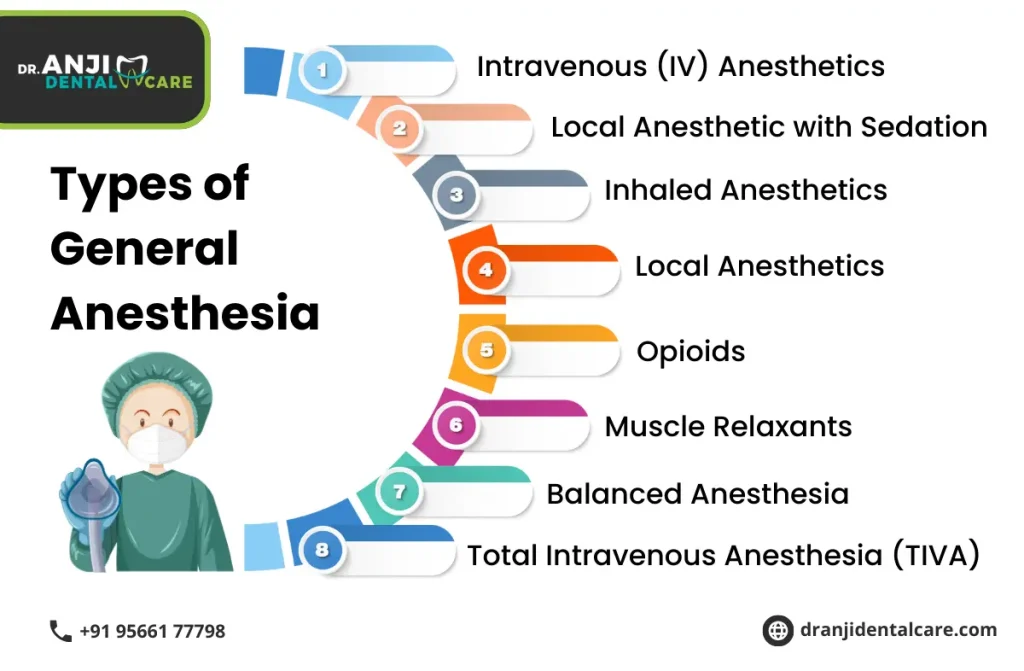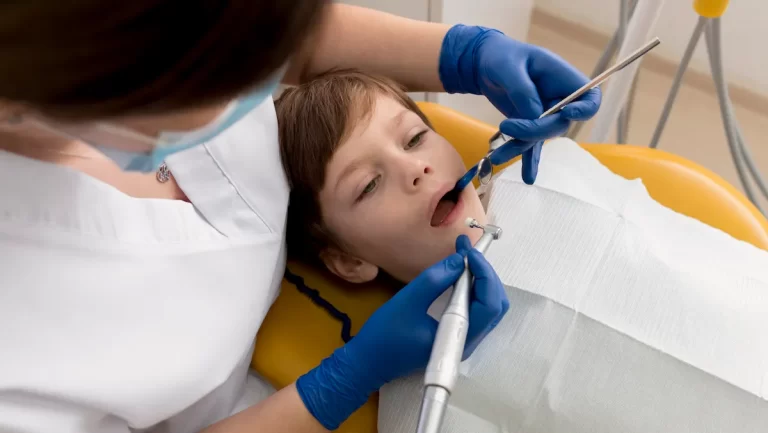General Anesthesia in Pediatric Dentistry: Ensuring Safety and Comfort for Children
General anesthesia is a specialized technique used in pediatric dentistry to provide a state of deep sleep and unconsciousness during dental procedures. The general anaesthetic dentist in chennai is primarily employed for children who have extensive dental needs, severe dental anxiety, special needs, or those unable to cooperate due to young age or medical conditions. We at Dr. Anji Dental Care aim to provide an overview of general anesthesia in pediatric dentistry, including its purpose, administration process, benefits, considerations, potential risks, and safety measures.

Purpose of General Anesthesia in Pediatric Dentistry
The primary purpose of general anesthesia for dental care in Chennai ensures the safety, comfort, and successful completion of dental procedures for children who cannot tolerate traditional methods of treatment. General anesthesia provides a controlled and deep state of unconsciousness, allowing dental professionals to perform complex or lengthy procedures while ensuring the child remains still and pain-free. It is particularly beneficial for children with extensive dental needs, severe dental anxiety, developmental or cognitive challenges, or those requiring invasive procedures such as tooth extractions or dental reconstructions. General anesthesia helps create a stress-free environment, enhancing the child’s overall dental experience and ensuring optimal treatment outcomes.
Administration of General Anaesthetic Dentist in Chennai
Preoperative Assessment: Before administering general anesthesia, the general anaesthetic dentist in chennai conducts a thorough preoperative assessment including a detailed medical history review, physical examination, and any necessary laboratory tests. The child’s overall health and readiness for anesthesia are evaluated, and any potential risks or contraindications are identified.
Anesthesia Induction: The child is typically taken to an operating room, or a specialized dental suite equipped for general anesthesia. An anesthesiologist or a specially trained dental professional administers the anesthesia medication through an intravenous (IV) line or inhalation mask. Once the child is under anesthesia, a breathing tube may be inserted to maintain proper oxygenation and ensure a clear airway during the procedure.
Procedure Execution: While the child is under general anesthesia, the dental procedure is performed by thegeneral anaesthetic dentist in chennai and dental team. This may include restorations, extractions, or other necessary dental treatments. The dental team closely monitors the child’s vital signs, anesthesia depth, and overall safety throughout the procedure.
Recovery and Postoperative Care: After completion of the dental procedure, the child is carefully monitored as they recover from anesthesia. Once the child’s vital signs stabilize, the anesthesia is discontinued, and the child is gradually awakened. Postoperative pain management and instructions are provided by the general anaesthetic dentist in chennai to ensure a smooth recovery process.
Benefits of General Anesthesia in Pediatric Dentistry General anesthesia offers several benefits for children undergoing dental procedures:
Complete Comfort and Unconsciousness: General anesthesia ensures that the child is completely unaware and unconscious during the dental procedure, eliminating fear, anxiety, and pain.
Enhanced Safety and Cooperation: General anesthesia allows for better control and cooperation during complex or lengthy procedures, ensuring optimal treatment outcomes and reducing the need for multiple appointments.
Dental Treatment for Medically Challenged Children: General anesthesia enables dental care for children with medical conditions, developmental challenges, or physical disabilities who may have difficulty tolerating conventional dental treatments.
Reduced Traumatic Memories: By providing a deep state of unconsciousness, general anesthesia helps prevent the child from forming traumatic memories associated with the dental procedure, reducing dental anxiety in the future.
Comprehensive Treatment in a Single Session: With general anesthesia for dental care in Chennai, multiple dental procedures can often be completed in a single session, minimizing the overall treatment duration and the need for repeated visits.
Considerations and Potential Risks While general anesthesia is generally safe, it is essential to consider the potential risks and take appropriate precautions:
Anesthesia Risks: General anesthesia carries inherent risks, including allergic reactions, breathing difficulties, changes in blood pressure, or adverse reactions to medications. A thorough preoperative assessment and careful monitoring during anesthesia minimize these risks.
Postoperative Effects: After waking up from general anesthesia, children may experience temporary side effects such as nausea, drowsiness, or confusion. The effects usually dissipate within a few hours.
Potential for Overmedication: Proper dosage calculations and monitoring are crucial to avoid overmedication, which can lead to respiratory depression or other complications. The presence of skilled general anaesthetic dentist in Chennai mitigates these risks.
Cost and Accessibility: General anesthesia requires specialized facilities and trained professionals, making it more expensive and less accessible than other sedation methods. The availability of general anesthesia may vary depending on the dental practice or healthcare setting.
Safety Measures and Caregiver Responsibilities
To ensure the safety of children undergoing general anesthesia, the following measures are typically implemented:
Preoperative Evaluation: A thorough preoperative assessment helps identify any medical conditions, allergies, or risk factors that may affect the child’s response to anesthesia.
Skilled Anesthesia Professionals: An experienced general anaesthetic dentist in Chennai or a dental professional trained in anesthesia administers and monitors the anesthesia, ensuring precise dosing, airway management, and safety throughout the procedure.
Monitoring and Emergency Preparedness: Continuous monitoring of vital signs, oxygenation, and anesthesia depth is performed during the dental procedure. The dental team is equipped and trained to manage potential emergencies or complications.
Caregiver Education and Support: Caregivers are provided with detailed preoperative and postoperative instructions, including information on dietary restrictions, medications, and signs of potential complications. Caregivers play a vital role in ensuring the child’s comfort, recovery, and adherence to postoperative care guidelines.
What do you mean by sedation?
Sedation refers to the administration of drugs or techniques to induce a state of calmness, relaxation, or sleepiness in an individual. It is commonly used in medical and dental procedures to alleviate anxiety, discomfort, or pain, allowing patients to undergo treatments more comfortably. Sedation can range from mild relaxation to deep unconsciousness, depending on the level of sedation required for a particular medical intervention.
How safe is sedation dentistry?
Sedation dentistry is generally considered safe when administered by qualified and experienced professionals in a controlled environment. The level of sedation varies, ranging from mild to deep, and is tailored to the patient’s specific needs and medical history. Common methods include oral sedatives, intravenous sedation, and nitrous oxide gas. While complications are rare, potential risks such as respiratory issues or allergic reactions exist, underscoring the importance of thorough pre-screening and monitoring during the procedure.
What are the side effects?
The side effects of a particular substance or medication can vary widely, but common adverse reactions may include nausea, dizziness, headache, fatigue, and allergic reactions. It is crucial to consult with a healthcare professional for personalized information based on individual health conditions and specific medications or substances involved.
Conclusion
To conclude, general anesthesia in pediatric dentistry at Dr. Anji Dental Care serves as an effective method for ensuring the safety, comfort, and successful completion of dental procedures in children with extensive needs or severe dental anxiety. By providing deep unconsciousness and enabling complex treatments, general anesthesia plays a valuable role in facilitating optimal dental care and promoting positive dental experiences for children.

